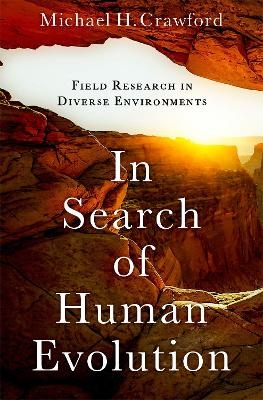
In Search of Human Evolution
Oxford University Press Inc (Verlag)
978-0-19-767940-1 (ISBN)
In Search of Human Evolution synthesizes more than 50 years of Crawford's research on the effects of migration on the evolution of human populations relocated to a series of unique environments. It documents the history of the field of anthropological genetics from its inception in 1973, through the information/computer revolution of the 1980s to the development of molecular characterization of human populations and the sequencing of the human genome. Crawford focuses on various facets of human evolution and migration in eight distinctive regions of the world, including sub-Arctic islands, tropical islands and coastal regions in the northern Caribbean, high valleys and arid regions in Mexico, the Artic taiga, and the plains of the Midwestern United States.
Throughout the book, Crawford provides an overview of the importance of conducting fieldwork and the ethics of field research. He examines why individuals and communities participate in such research, and what the future of field research is in these times of epidemics and political instability.
Michael H. Crawford was born in Shanghai, China, but lived in displaced persons camps in the Philippine Islands (Tubabao) and Australia (Urunquity), before emigrating to the United States in 1952. He completed his Ph.D. in Anthropology and Genetics at the University of Washington in 1967. Crawford was Professor of Anthropology and Genetics at the University of Kansas and conducted field research in Mexico, Italy, Guatemala, Siberia, Aleutian Islands, India and Australia. In 1975, he established the Laboratory of Biological Anthropology (KU), where he directed the research of 41 Ph.D. students until his retirement as Emeritus Professor in 2019.
Chapter 1: Introduction to Fieldwork and Evolution
Chapter 2: Background and Preparation for Fieldwork
Chapter 3: Admixture and Genetic Differentiation of Transplanted Tlaxcaltecan Populations
Chapter 4: Origins of the Irish Travelers (Tinkers)
Chapter 5: Black Caribs (Garifuna) of Central America An Evolutionary Success Story
Chapter 6: Biological Aging and Population Structure of Midwest Mennonites
Chapter 7: Genetic Structure and Origins of Siberian and Alaskan Arctic Populations
Chapter 8: Aleutian Islands Small-Island Evolution
Chapter 9: Bio-demography of Italian and Hungarian Populations
Chapter 10: Genetic Epidemiology Primate (Baboon) Models of Disease
Chapter 11: Basque Origins and Genetic Structure
Chapter 12: Conclusion
| Erscheinungsdatum | 25.04.2024 |
|---|---|
| Zusatzinfo | 40 |
| Verlagsort | New York |
| Sprache | englisch |
| Maße | 160 x 241 mm |
| Gewicht | 431 g |
| Themenwelt | Naturwissenschaften ► Biologie ► Humanbiologie |
| Sozialwissenschaften ► Ethnologie | |
| Sozialwissenschaften ► Soziologie | |
| ISBN-10 | 0-19-767940-4 / 0197679404 |
| ISBN-13 | 978-0-19-767940-1 / 9780197679401 |
| Zustand | Neuware |
| Informationen gemäß Produktsicherheitsverordnung (GPSR) | |
| Haben Sie eine Frage zum Produkt? |
aus dem Bereich


